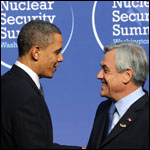NSG Should Lead By Example on Sensitive Technology Transfers Pierre Goldschmidt | Proliferation Analysis
When the participating governments of the Nuclear Suppliers Group (NSG) convene in June under the chairmanship of the Netherlands, they will face an especially difficult and thorny agenda.
|
|
|
Fredrik Dahl | Reuters
Syria has promised to cooperate with a U.N. nuclear inquiry into a suspected reactor site bombed by Israel in 2007, an apparent last-minute bid by Damascus to derail a Western push to report it to the U.N. Security Council. Full Article
Judy Dempsey and Jack Ewing | New York Times
The German government on Monday announced plans to shut all of the nation's nuclear power plants within the next 11 years, a sharp reversal for Chancellor Angela Merkel after the Japanese disaster at Fukushima caused an electoral backlash by voters opposed to reliance on nuclear energy. Full Article
The Mainichi Daily News
Prime Minister Naoto Kan said that Japan will dramatically change its energy policy to be less dependent on fossil fuel and nuclear power, unveiling a new target of generating 20 percent of its electricity from natural resources as soon as possible in the 2020s. Full Article
Xinhua
There is little hope that Russia and NATO will agree on building a joint missile shield, a report released here on Sunday at the NATO Parliamentary Assembly spring session said. Full Article
Siobhan Gorman and Julian E. Barnes | Wall Street Journal
The Pentagon has concluded that computer sabotage coming from another country can constitute an act of war, a finding that for the first time opens the door for the U.S. to respond using traditional military force. Full Article
|

